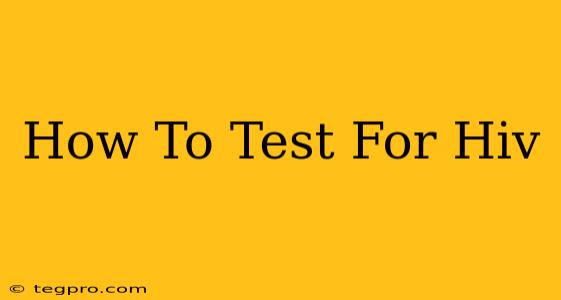Knowing your HIV status is crucial for your health and well-being. Early diagnosis allows for prompt treatment, significantly improving quality of life and preventing transmission. This comprehensive guide explains how to get tested for HIV, dispelling common myths and misconceptions surrounding the process.
Understanding HIV Testing
HIV, or Human Immunodeficiency Virus, attacks the body's immune system, leaving individuals vulnerable to opportunistic infections. Testing is the only way to determine if you have the virus. Fortunately, HIV testing has become incredibly accessible, affordable, and straightforward.
Types of HIV Tests
Several types of HIV tests are available, each with its own advantages and disadvantages:
-
Antibody Tests: These tests detect antibodies your body produces in response to the HIV virus. These antibodies typically appear within 1-3 months of infection (the "window period"), although some tests can detect infection sooner. Antibody tests are the most common type and are highly accurate. They can be performed using blood, oral fluid, or fingerstick methods.
-
Antigen/Antibody Tests: These tests detect both HIV antibodies and p24 antigen, a protein produced by the virus. This allows for earlier detection, often within weeks of infection. These tests are becoming increasingly common.
-
Nucleic Acid Tests (NAT): These tests detect the HIV genetic material itself (RNA or DNA). NAT tests are the most sensitive and can detect the virus even earlier than antigen/antibody tests. However, they are generally more expensive and less commonly used for routine screening.
Where to Get Tested for HIV
Accessibility to HIV testing is paramount. Here are some places where you can get tested:
-
Your Doctor's Office: Many primary care physicians offer HIV testing as part of routine check-ups.
-
Public Health Clinics: These clinics offer confidential and often free HIV testing.
-
Community Health Centers: These centers provide comprehensive healthcare services, including HIV testing.
-
Testing Centers: Dedicated HIV testing centers offer rapid results and counseling.
-
Home Testing Kits: At-home HIV tests are available online and in some pharmacies, allowing for testing in the privacy of your home. These kits typically involve collecting a sample of blood or oral fluid and sending it to a lab for analysis. Remember to follow instructions carefully.
-
Hospitals: Most hospitals provide HIV testing services.
What to Expect During an HIV Test
The testing process is generally quick and painless. For blood tests, a small blood sample is taken from a vein in your arm. For oral fluid tests, you'll need to swab your gums. Rapid tests provide results in minutes, while others may take a few days to a week.
Before testing: It's beneficial to talk to a healthcare professional about your concerns and risk factors. This will ensure you receive appropriate counseling and understand the results fully.
After testing: Whether positive or negative, you'll receive counseling to help you understand the results and your next steps. If the result is positive, you'll be connected with healthcare providers who can help you manage your condition.
Understanding Your Results
-
Positive Result: A positive result means you have HIV. It is crucial to begin treatment immediately. Early intervention is vital in managing the virus and preventing progression to AIDS.
-
Negative Result: A negative result means the test did not detect HIV antibodies or antigens. However, it’s important to remember the window period. If you are concerned or have engaged in risky behaviors, it is recommended to retest after the window period (usually 3 months).
-
Inconclusive Result: In rare cases, a test may produce an inconclusive result. This typically requires a follow-up test.
Dispelling Myths About HIV Testing
Many misconceptions surround HIV testing. It's important to rely on factual information from reputable sources. HIV testing is confidential, painless, and readily accessible. Getting tested is a sign of responsibility and self-care.
Conclusion
Regular HIV testing is an essential part of preventative healthcare. Don't hesitate to get tested – it's a simple step that can make a world of difference in your health and the health of your community. Early detection and treatment are key to living a long and healthy life with HIV. Take control of your health and get tested today!

